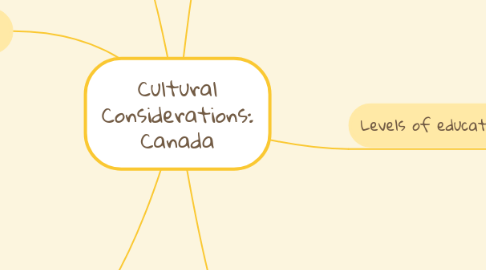Cultural Considerations: Canada
создатель AUSMAT SUNWAY


1. Holidays and Celebrations
1.1. Civic Holiday is also celebrated in most provinces and territories and gives a long weekend at the beginning of August.
1.2. Major celebrations : New Year's Day, Good Friday, Easter Monday, Victoria Day, Canada Day, Thanksgiving Day, Remembrance Day,
2. Religion
2.1. The range of religions practised in Canada are as diverse as its inhabitants, and freedom of religion is a constitutionally protected right.
2.2. Atheism has also been increasing steadily in recent decades, and around 24% of Canadians now state that they have no religious affiliation.
2.3. Christianity is the most prevalent, with around 65% of the population as adherents.
3. Business Etiquette
3.1. The dress code of businessmen in Canada usually consists of a very conventional tie and suit and smart dress or suit for the women.
3.2. Academic titles like "Monsieur" and "Madam" are important in Canada especially in Quebec but otherwise "Mr" and "Mrs" is used unless first names are allowed.
3.3. Although business card culture is quite informal in Canada, it is usually advised for the receiver to look at the card before keeping it. If a business card is needed, it usually is advised to have a French side printed to accommodate the French speakers in Canada,
3.4. When doing a presentation, there should be facts and figures to substantiate claims and promises. Canadians are essentially very rational and logical people and will not be swayed by passion, feelings or emotions.
4. Customs
4.1. Last names and appropriate titles should be used until otherwise invited to be less formal
4.2. The table manners are fairly informal when dining with locals, you don't need to worry about refusing particular dishes or asking questions about the food. Do make sure to say please and thank you.
4.2.1. If you are invited to someone's home for a meal, it is considered polite to bring a small gift such as a bottle of wine or some chocolates.
5. Levels of educations
5.1. Compulsory up to the age of 16 in every province in Canada. Exception : Manitoba, Ontario, and New Brunswick : compulsory age is 18, or as soon as a high school diploma has been achieved
5.2. No federal education department or educational system. Provincial governments manage and oversee public education within their provinces (all levels). They receive funding from the local, provincial and federal governments.
5.2.1. Average adult with minimum high school education : Canada : 90% OECD : 76% Average adult with a bachelor's degree or higher : Canada : 54% (World Best) OECD : 34% (2014 data)
5.2.1.1. National education spending in 2014 : C$ 57.18 Billion ( 67% increase since 2000 ) 70% of budget -> instruction & education services Average annual tuition for an undergraduate program : C$ 6373 (year 2016-2017) **lower than average in US.
